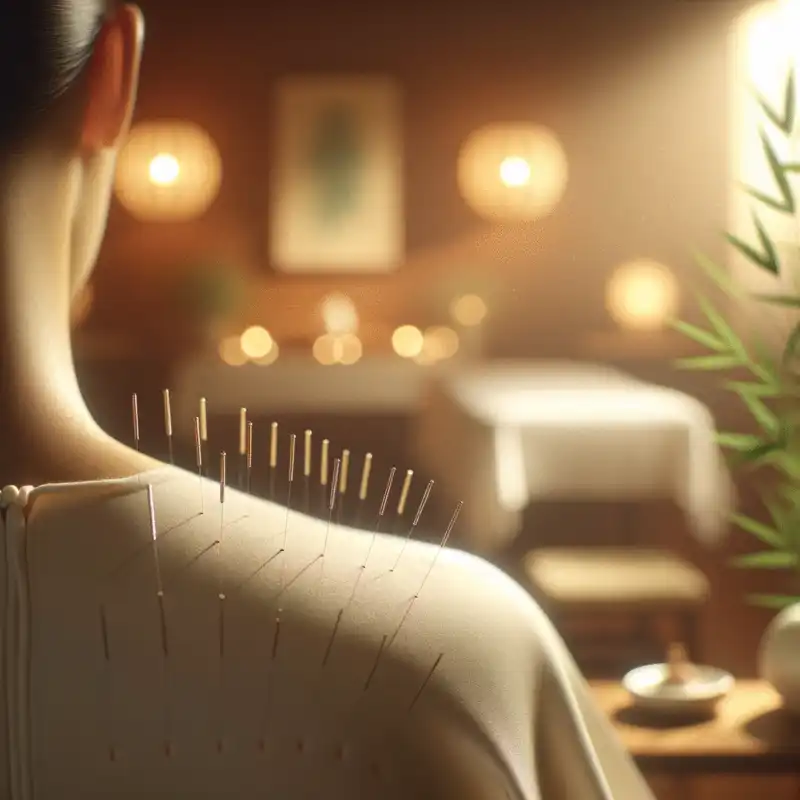Acupuncture's Role in Mental Health

Posted on: 2025-05-06
By: Kaiya Whitmore
Acupuncture and Mental Health: A Holistic Approach
Acupuncture has long been recognized as a tool for physical healing, but its profound impact on mental health is gaining increasing attention. As a holistic practice, it not only targets physical ailments but also addresses emotional well-being. This article will delve into how acupuncture can enhance mental health, exploring its benefits and its integration with modern therapeutic approaches.
What You Will Learn
- Acupuncture operates on the principle of restoring Qi flow, which can lead to improved mental clarity and emotional stability.
- Integrative medicine combines acupuncture with contemporary treatments, enhancing relaxation, focus, and holistic healing.
- Traditional Chinese Medicine views mental health as interconnected with physical health, emphasizing the importance of maintaining balance.
- Evidence-based practices in acupuncture increase treatment credibility and improve patient outcomes through ongoing research.
- Combining acupuncture with therapies like cognitive behavioral therapy can significantly enhance emotional resilience and healing experiences.
- Many individuals have reported transformative mental health improvements through acupuncture, including reduced anxiety and better sleep quality.
- Exploring wellness programs that integrate acupuncture can provide a supportive environment for your mental health journey.
Benefits of Integrating Acupuncture in Mental Health Treatment
Acupuncture offers a holistic approach to mental wellness, enhancing traditional treatment methods. Below are key benefits of integrating acupuncture with mental health therapies:
Enhanced Relaxation
Acupuncture can reduce stress hormones, promoting deeper relaxation.
Improved Focus
Helps clear mental fog and enhances concentration.
Holistic Healing
Addresses the whole person, promoting overall mental health.
Integration with Psychotherapy
Combining acupuncture with traditional therapies enhances treatment outcomes.
Understanding the Connection Between Acupuncture and Mental Health
The relationship between acupuncture and mental health is a fascinating one that has garnered significant attention over the years. At Acupuncture Perspectives, we believe in the power of traditional healing methods to enhance overall wellness, including mental well-being. Acupuncture, in its essence, involves inserting thin needles into specific points on the body to stimulate energy flow, or *Qi*. This practice can promote balance and harmony, which are essential components for mental health. For a deeper understanding of the principles behind acupuncture, explore our article on Understanding Acupuncture and Chinese Medicine.
Have you ever felt overwhelmed by stress or anxiety? You’re not alone! Many people today are turning to acupuncture not just for physical ailments but also to support their mental health. By understanding how this ancient practice works, we can better appreciate its role in promoting emotional balance and wellness.
What is Acupuncture and How Does It Work?
Acupuncture is rooted in *Traditional Chinese Medicine (TCM)* and has been practiced for thousands of years. The core belief is that our bodies are governed by energy pathways, and when these pathways are blocked, it can lead to various health issues, including mental health concerns. By placing needles in specific points, we can help restore the flow of *Qi*, leading to improved mental clarity and emotional stability.
Each acupuncture session can vary based on individual needs. Some common techniques include:
- Manual stimulation: The acupuncturist may gently manipulate the needles.
- Electroacupuncture: A small electrical current is used to enhance the effects.
- Cupping or moxibustion: These methods can be combined with acupuncture to further promote relaxation.
Understanding how acupuncture interacts with our body is crucial. It’s not just about inserting needles; it’s about fostering a deeper connection to oneself and addressing both physical and mental health issues holistically.
The Role of Integrative Medicine in Mental Health Treatment
Integrative medicine combines traditional practices like acupuncture with modern medical approaches to create a comprehensive treatment plan. It recognizes that mental health disorders often require a multifaceted approach. Integrative methods can include therapy, medication, and lifestyle changes, alongside acupuncture.
At Acupuncture Perspectives, I often hear from clients who appreciate this holistic approach. They find that by combining acupuncture with other treatments, they can experience greater relief from their symptoms. Here are some benefits of integrating acupuncture into mental health treatment:
- Enhanced relaxation: Acupuncture can reduce stress hormones, promoting deeper relaxation.
- Improved focus: Many find that acupuncture helps clear mental fog and improves concentration.
- Holistic healing: It addresses the whole person, not just symptoms, which is vital for mental health.
By focusing on the interconnectedness of body and mind, integrative medicine allows for personalized treatment plans that can lead to significant improvements in mental wellness. To learn more about acupuncture's role in Western medicine, read our article on Acupuncture's Role in Western Medicine.
Traditional Chinese Medicine and Its Approach to Mental Wellness
Traditional Chinese Medicine (TCM) offers a unique perspective on mental health, viewing it as an integral part of overall well-being. TCM emphasizes that emotional health is not separate from physical health; they are deeply interconnected. For example, imbalances in the liver can contribute to feelings of anger or frustration, while a weak spleen may lead to anxiety and worry.
In TCM, emotional issues are often tied to specific organs, and by treating these organs through acupuncture, we can also support emotional healing. Some key principles of TCM related to mental health include:
- Balance of Yin and Yang: Maintaining harmony between these opposing forces is crucial for emotional health.
- Qi stagnation: Blocked energy flow can lead to negative emotional states, making acupuncture an essential tool for release.
- Diet and lifestyle: TCM also emphasizes the importance of nutrition and lifestyle choices in supporting mental well-being.
By integrating TCM principles into modern mental health practices, we can cultivate a more profound sense of balance and harmony in our lives. Embracing this holistic approach allows us to explore the many dimensions of our mental health journey. Discover more global perspectives on acupuncture in our article: Global Perspectives on Acupuncture.
Engage with Us!
We'd love to know your thoughts on acupuncture and its benefits for mental health. Have you ever tried acupuncture for emotional well-being? What was your experience like? Share your insights below:
Concluding Insights on Acupuncture for Mental Health
As we wrap up our exploration of acupuncture's role in mental health, it's clear that understanding the connection between these two realms is crucial. Acupuncture is not merely about needles and meridians; it offers a holistic approach that addresses both the mind and the body. At Acupuncture Perspectives, we believe that integrating evidence-based practices can help demystify how acupuncture can support mental wellness.
Emphasizing evidence-based practice is vital for practitioners and patients alike. Research findings provide a foundation for confidence in treatments. Incorporating data into acupuncture helps bridge the gap between traditional practices and modern healthcare. By relying on scientific insights, we can better understand the efficacy of acupuncture for conditions such as anxiety, depression, and stress management.
The Importance of Evidence-Based Practice in Acupuncture
Integrating evidence into acupuncture practices ensures that patients receive the best possible care. Studies highlight the effectiveness of acupuncture in managing mental health issues, making it an attractive option for many. Evidence-based practice also enhances the credibility of acupuncture among healthcare professionals and patients.
- Improves treatment quality and outcomes.
- Increases patient trust and satisfaction.
- Encourages collaboration between acupuncturists and other healthcare providers.
Incorporating ongoing research into practice is essential. For practitioners like me, it means staying updated on the latest findings to provide informed care. By discussing these insights with patients, we can empower them to make educated choices regarding their mental health journeys.
Future Directions in Research on Acupuncture and Mental Well-Being
The future of acupuncture in mental health looks promising! As more research unfolds, we anticipate a deeper understanding of how acupuncture can be tailored to individual needs. Future studies will likely focus on exploring the mechanisms behind acupuncture's effectiveness, such as its impact on neurobiology and emotional regulation.
- Investigating specific acupuncture points for targeted mental health issues.
- Exploring long-term effects of acupuncture on mental health.
- Analyzing the combination of acupuncture with other therapeutic modalities.
At Acupuncture Perspectives, we are excited to follow these developments and share new findings with our community. Understanding these emerging trends provides a clearer picture of how acupuncture can evolve to meet the needs of those seeking mental health support. Learn more about the benefits of acupuncture from our expert insights: Insights on Acupuncture Benefits.
Integrating Acupuncture with Psychotherapy and Cognitive Behavioral Therapy
Combining acupuncture with traditional therapies can create a comprehensive approach to mental wellness. For example, integrating acupuncture with psychotherapy or cognitive behavioral therapy (CBT) often enhances treatment outcomes. This fusion aims to support both emotional and physical well-being, addressing the whole person rather than just symptoms.
- Improves emotional resilience and coping strategies.
- Boosts the effectiveness of therapeutic sessions.
- Encourages holistic healing, fostering a sense of balance.
Many clients have found that the synergy between acupuncture and talk therapies creates a more profound healing experience. By focusing on both the mind and body, we can help individuals navigate their emotional challenges with greater ease. For real stories on healing through acupuncture, check out our article Healing Through Acupuncture: Real Stories.
Encouragement to Consider Acupuncture as a Mental Health Option
If you’re exploring options for mental wellness, I encourage you to consider acupuncture! Many individuals have found success in alleviating their symptoms through this ancient practice. It’s fascinating to see how people’s lives transform when they embrace acupuncture as part of their healing journey.
Sharing Personal Experiences: Community Testimonials
Hearing from others about their acupuncture experiences can be inspiring. Community testimonials highlight the positive changes that often accompany treatments:
- One patient shared that regular acupuncture sessions helped her manage her anxiety and improved her overall mood.
- Another individual found that combining acupuncture with therapy provided a more rounded approach to tackling depression.
- A local client reported significant improvements in sleep quality after receiving acupuncture for insomnia.
These stories exemplify the transformative power of acupuncture in mental health, and I invite you to explore similar outcomes through your own experiences.
Next Steps: Consulting a Professional for Acupuncture Treatment
Taking the first step towards acupuncture is easier than you may think! I recommend consulting a qualified acupuncture practitioner who can assess your individual needs. During your first visit, be open about your mental health goals and concerns, as this will help tailor your treatment effectively.
- Research local practitioners and read reviews from past clients.
- Schedule an initial consultation to discuss your health history.
- Be prepared to ask questions about treatment plans and expected outcomes.
Working with a professional can guide you to a personalized path toward healing, making the journey much more rewarding.
Exploring Wellness Programs that Include Acupuncture
Many wellness programs now incorporate acupuncture into their offerings, recognizing its benefits for mental health. Whether through community health centers or holistic wellness clinics, these programs provide structured environments for individuals to explore acupuncture safely.
- Look for wellness retreats that focus on holistic health.
- Explore local health centers that offer integrative medicine services.
- Join support groups that focus on holistic approaches to mental health.
At Acupuncture Perspectives, we are committed to fostering a community that values holistic solutions. By embracing acupuncture as part of your mental health journey, you could unlock new pathways to well-being and resilience!
Recap of Key Points
Here is a quick recap of the important points discussed in the article:
- Acupuncture promotes mental well-being by restoring the flow of *Qi*, addressing both body and mind.
- Integrative medicine enhances mental health treatment by combining acupuncture with therapy and lifestyle changes.
- Traditional Chinese Medicine views emotional health as interconnected with physical health, emphasizing balance and energy flow.
- Evidence-based practice in acupuncture improves treatment quality and patient trust.
- Future research is expected to explore the mechanisms of acupuncture for mental health and its combinations with other therapies.
- Combining acupuncture with psychotherapy can enhance emotional resilience and overall treatment outcomes.
Frequently Asked Questions
What is Acupuncture and How Does it Relate to Mental Health?
Acupuncture, a key component of Traditional Chinese Medicine, involves inserting thin needles into specific points on the body to stimulate energy flow (Qi). Restoring this flow is believed to improve mental clarity and emotional stability, addressing mental health concerns holistically.
How Does Integrative Medicine Incorporate Acupuncture?
Integrative medicine combines acupuncture with modern medical approaches like therapy and medication. This multifaceted approach recognizes that mental health disorders often require a variety of treatments to achieve optimal results.
What Role Does Traditional Chinese Medicine (TCM) Play?
TCM views mental and physical health as deeply interconnected. Emotional imbalances are seen as linked to specific organs, and acupuncture can address these imbalances to support emotional healing. Key TCM principles include balancing Yin and Yang and addressing Qi stagnation.
Is Acupuncture Evidence-Based?
Yes, evidence-based practices are increasingly important in acupuncture. Research shows its effectiveness in managing various mental health issues, boosting its credibility and improving patient outcomes.
Can Acupuncture Be Combined with Other Therapies?
Absolutely! Combining acupuncture with psychotherapy or cognitive behavioral therapy (CBT) often leads to enhanced treatment outcomes, providing a more comprehensive approach to mental wellness.
Where Can I Find Acupuncture Treatment?
Many wellness programs now offer acupuncture, alongside qualified practitioners and clinics. It's best to research local practitioners, read reviews, and schedule an initial consultation to discuss your needs.
 Acupuncture's journey from ancient practice to modern healthcare staple is a fascinating tale of evo
Acupuncture's journey from ancient practice to modern healthcare staple is a fascinating tale of evo
 In a world where holistic health practices are gaining traction, understanding how to evaluate treat
In a world where holistic health practices are gaining traction, understanding how to evaluate treat
 In the ever-evolving world of healthcare, acupuncture is carving out a significant niche in chronic
In the ever-evolving world of healthcare, acupuncture is carving out a significant niche in chronic